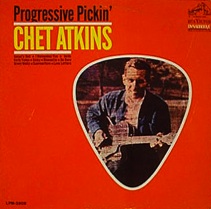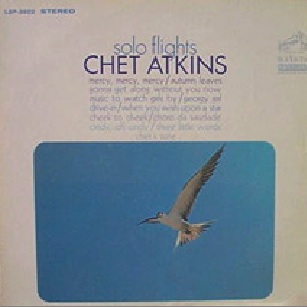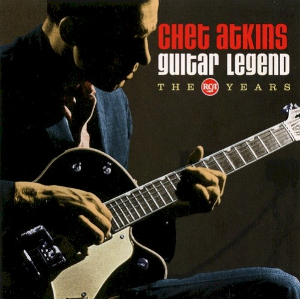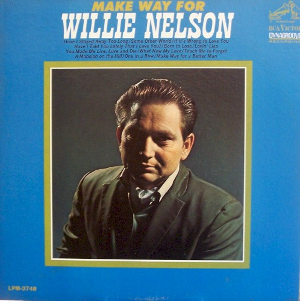
Both Sides Of An Evening is the fifth studio album and released in 1961 by The Everly Brothers. Though it was released at the peak of their career, it failed to make any of the record charts.

Here Comes My Baby is a studio album by American country music artist Dottie West. It was released in June 1965 on RCA Victor Records and was produced by Chet Atkins. It was West's debut studio album as a recording artist and was issued following the success of the title track in 1964. The latter song won a Grammy Award in early 1965 which prompted the issue of the album. Here Comes My Baby would start a series of studio recordings West would release for RCA.

A Session with Chet Atkins is the third studio album recorded by American guitarist Chet Atkins. It features Atkins introducing standard pop and jazz melded with country sensibilities. The liner notes state this is the first use of a celeste on a country record. The musicians include Homer and Jethro in the rhythm section. Atkins uses his new EchoSonic amplifier for the first time on his recordings.

Chet Atkins at Home is the seventh studio album recorded by American guitarist Chet Atkins. It contains his clever arrangement of Yankee Doodle played at the same time as Dixie.

Chester & Lester is a collaborative album by guitarists Chet Atkins and Les Paul released by RCA Records in 1976.

The Most Popular Guitar is the fifteenth studio album by guitarist Chet Atkins, released in 1961. It is an example of his highly orchestrated, smooth sound with lush strings and vocal choruses. While it did not top the chart action of his previous release Chet Atkins' Workshop, it spent ten weeks on the Billboard LP chart.

Read My Licks is the fifty-sixth studio album by American guitarist Chet Atkins.

Progressive Pickin' is the twenty-fifth studio album by guitarist Chet Atkins.

Solo Flights is the thirty-sixth studio album by Chet Atkins. Side one of this album features Atkins' experiment with the "Octabass Guitar," where he replaced the two low strings with heavier strings in order to drop an octave and create a fuller sound with bass.

Guitar Legend: The RCA Years is a two-disc compilation recording by American guitarist Chet Atkins. The 50 tracks included here focus on his first recordings in 1947 to the 1977 release Nashville Guitar Quartet.

Galloping Guitar: The Early Years is a multi-disc box-set retrospective recording by American guitarist Chet Atkins, released in 1993 on the Bear Family label.

Standard Brands is an album by guitarists Lenny Breau and Chet Atkins that was released in 1981.

Reminiscing is the first collaborative long-play recording by American country music artists Chet Atkins and Hank Snow, released in 1964.

The Best of Chet Atkins & Friends is a compilation recording by American guitarist Chet Atkins, released in 1976. It peaked at number 25 on the Billboard Country Albums charts in 1977.

The Everly Brothers' Best is the first compilation album by American singing duo the Everly Brothers, released in 1959 by their first record company, Cadence Records. The album contains both sides of their first six singles for the label in chronological order. Allmusic states in their review: "this original Cadence compilation still holds up nicely after almost half-a-century."

The Party's Over and Other Great Willie Nelson Songs is the sixth studio album by country singer Willie Nelson.

Make Way for Willie Nelson is the fifth studio album by country singer Willie Nelson.

That Gibson Boy is a studio album by American country singer Don Gibson, released in 1959.

Boy Wonder is a studio album by jazz guitarist Lenny Breau that was recorded in 1956 and released in 1998. The session was engineered and produced by Al Hawkes of Event Records.
"We Didn't See a Thing" is a duet recorded by Ray Charles and George Jones. The Gary Gentry composition was produced by Billy Sherrill and features Chet Atkins on guitar.




















